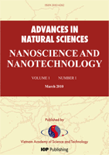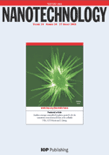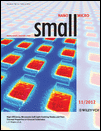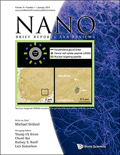
Advances in Natural Sciences-Nanoscience and Nanotechnology
metrics 2024
Transforming Ideas into Nanotechnological Breakthroughs
Introduction
Advances in Natural Sciences-Nanoscience and Nanotechnology is a premier academic journal published by IOP Publishing Ltd, dedicated to the dynamic and rapidly evolving field of nanoscience and nanotechnology. With an ISSN of 2043-6254 and E-ISSN 2043-6262, this journal encompasses a diverse spectrum of research encompassing both theoretical frameworks and applied technologies, bridging the gap between engineering, industrial practices, and materials science. Holding a reputable position within the Q3 quartile for Electrical and Electronic Engineering, Q2 in Industrial and Manufacturing Engineering, and Q3 in Materials Science, it ranks significantly due to its robust review process and quality of articles. With a convergence span from 2010 to 2024, the journal aims to foster an open dialogue among researchers and professionals, providing essential insights into cutting-edge advancements and interdisciplinary applications in nanotechnology. The open access policy enhances visibility and accessibility, ensuring that every article extends its reach beyond the confines of traditional scholarly communication. Situated in the United Kingdom, this journal not only bolsters the global discourse on nanoscience but also serves as a critical resource for those at the forefront of research and innovation.
Metrics 2024
 -
- 1.70
1.70 -
- -
-Metrics History
Rank 2024
IF (Web Of Science)
JCI (Web Of Science)
Quartile History
Similar Journals

Nano Express
Advancing nanotechnology for a transformative future.Nano Express is an esteemed open-access journal published by IOP Publishing Ltd, dedicated to advancing research in the fields of nanotechnology and materials science. Since its launch in 2020, the journal has swiftly established itself as a vital resource for researchers and professionals, garnering significant recognition in various domains, including biomaterials, electronic, optical and magnetic materials, and polymers and plastics. With a commendable categorization in Scopus quartiles, it ranks in Q2 for Electronic, Optical and Magnetic Materials, and maintains a top percentile in several others, exemplifying its commitment to high-quality research dissemination. Located in the United Kingdom, this journal fosters a global dialogue among experts and newcomers alike, facilitating open access to innovative research that drives the future of nanotechnology. By offering a platform for groundbreaking studies and reviews, Nano Express aims to bridge the gap between theoretical understanding and practical application, championing the development of next-generation materials that have the potential to transform various industries.

MRS Advances
Pioneering Research for Tomorrow's TechnologiesMRS Advances, published by Springer Heidelberg, is an esteemed academic journal that serves as a vital platform for disseminating cutting-edge research in the fields of condensed matter physics, materials science, and mechanical engineering. With an ISSN of 2731-5894 and an E-ISSN of 2059-8521, the journal is hosted in Switzerland and encompasses an impressive spectrum of innovative studies that impact both theoretical and practical applications. Throughout its converged years from 2012 and continuing through 2024, MRS Advances has established itself with notable rankings, including Q4 in condensed matter physics and Q3 in several related categories. This journal not only enriches the academic community with its rigorous peer-reviewed articles, but also encourages open discussions that further advance research innovations. Although currently not designated as an open-access journal, its accessibility through institutional subscriptions ensures that professionals, researchers, and students can engage with the latest advancements in the material science arena. Emphasizing its relevance, MRS Advances is dedicated to fostering interdisciplinary collaboration and inspiring new discoveries within the global research community.

NANOTECHNOLOGY
Pioneering Research in Nanotechnology and Beyond.NANOTECHNOLOGY is a premier academic journal published by IOP Publishing Ltd, focusing on cutting-edge advancements in the interdisciplinary field of nanoscience and nanotechnology. With a strong emphasis on research that bridges biology, chemistry, engineering, and materials science, this journal presents high-quality, peer-reviewed articles that cater to the diverse interests of researchers, professionals, and students alike. NANOTECHNOLOGY boasts an impressive ISSN: 0957-4484 and E-ISSN: 1361-6528, and holds a notable position within Scopus, ranked in the second quartile (Q2) across multiple categories including Bioengineering and Mechanical Engineering, underscoring its vital role in advancing the field. The journal's impact is further highlighted by its robust rankings, making it essential reading for those looking to stay at the forefront of nanotechnology research. Commencing in 1990 and with publication extending through to 2024, NANOTECHNOLOGY provides a unique platform for disseminating significant findings and innovative methodologies while fostering collaborations across various scientific disciplines. In a rapidly evolving technological landscape, this journal not only enhances academic discourse but also contributes to the practical applications of nanotechnology in real-world scenarios.

Nanofabrication
Leading the Charge in Nanotechnology AdvancementsNanofabrication is a leading open-access journal dedicated to advancing the field of nanotechnology through innovative research and comprehensive reviews. Published by the Eurasia Academy Publishing Group (EAPG) since 2014, this journal aims to provide a platform for academic discourse, promoting the latest insights and findings in nanofabrication techniques and applications across diverse domains, including materials science, electronics, and drug delivery systems. With a commitment to accessibility, Nanofabrication ensures that all content is freely available to researchers, professionals, and students worldwide, thereby fostering collaboration and knowledge sharing in the rapidly evolving landscape of nanotechnology. The journal's emphasis on high-quality, peer-reviewed research positions it as an authoritative source for those looking to stay at the forefront of developments in the field.

Small
Navigating the Interplay of Small Materials and Big Ideas.Small is a premier academic journal published by WILEY-V C H Verlag GmbH, focusing on cutting-edge research across a multitude of disciplines including biomaterials, biotechnology, chemistry, engineering, materials science, medicine, and nanoscience. With an impressive impact factor and recognized in the top quartile (Q1) across these categories, Small serves as a vital platform for scientists and researchers aiming to disseminate innovative findings and explore the interplay between small-scale materials and their large-scale applications. Enjoying a broad readership, the journal has been key in advancing knowledge from its inception in 2005 and aims to foster collaborations and discussions that steer the future of material science and biotechnology. Though not open access, research published in Small remains invaluable for professionals and students eager to explore the advancements at the nanoscale, promoting a comprehensive understanding of modern scientific challenges and opportunities.

Journal of Nano Research
Leading the Charge in Nano DiscoveriesThe Journal of Nano Research, published by Trans Tech Publications Ltd, is a distinguished academic journal dedicated to the rapidly evolving field of nanotechnology and materials science. With an ISSN of 1662-5250 and an E-ISSN of 1661-9897, the journal has been an important platform for researchers and professionals since its inception in 2008, continuing to provide high-quality peer-reviewed research through to 2024. Nestled in Switzerland, the Journal of Nano Research plays a pivotal role in disseminating cutting-edge findings, as recognized by its categorization in Q3 for Materials Science and Physics while being positioned in Q4 for Nanoscience and Nanotechnology as of 2023. With Scopus rankings highlighting its impact, including Rank #129 in general Physics and Astronomy and Rank #300 in Materials Science, this journal is crucial for academics seeking to stay ahead in research trends and innovations in nano-related disciplines. Although it operates under a subscription model, the journal's objectives include fostering collaboration and knowledge-sharing among researchers, making it an invaluable resource for anyone immersed in the world of nanotechnology.

ACS Applied Nano Materials
Exploring the Frontiers of Nanotechnology.ACS Applied Nano Materials, published by the American Chemical Society, is a premier journal that serves as a vital resource in the rapidly evolving field of nanomaterials. With a commendable impact factor placing it in the Q1 category of Materials Science in 2023, this journal has established itself as a leading platform for disseminating high-quality research that showcases innovative applications and advancements in nanomaterial science. Since its inception in 2018, it has consistently aimed to bridge the gap between fundamental research and practical application, making it a crucial reference for researchers, professionals, and students interested in cutting-edge nanotechnology. Access options for the journal encourage collaboration and knowledge sharing within the scientific community, reflecting the journal's commitment to fostering advancements in the field. With its base in Washington, D.C., ACS Applied Nano Materials is positioned at the forefront of scientific dialogue, exploring the implications of nanomaterials in various domains, ultimately contributing to technological innovations that impact everyday life.

NANO
Shaping the Future of Nanoscience and TechnologyNANO is an esteemed academic journal published by World Scientific Publishing Co. Pte Ltd, focusing on the frontier of nanoscience and nanotechnology. With ISSN 1793-2920 and E-ISSN 1793-7094, this journal has been a pivotal platform for disseminating innovative research from 2008 to 2024. Located in Singapore, NANO has established itself within the academic community, currently holding notable rankings in the Q3 Category for both Condensed Matter Physics and Materials Science, as well as a Q4 Category status in Nanoscience and Nanotechnology. Though it operates under a non-open access model, its contributions are invaluable for researchers, professionals, and students seeking to stay abreast of the latest advancements and interdisciplinary approaches within the nanoscale domain. By providing in-depth articles, reviews, and insights, NANO plays a significant role in advancing our understanding of materials at the nanoscale, thereby fostering innovation and collaboration across related fields.

Micro & Nano Letters
Connecting ideas in micro and nanoscale research.Micro & Nano Letters is a prominent open-access journal published by WILEY, dedicated to advancing the fields of micro and nanoscale science and technology. Since its inception in 2007, the journal has been a valuable resource for researchers, professionals, and students, delivering high-quality research that supports innovation and collaboration in bioengineering, biomedical engineering, condensed matter physics, materials science, and nanoscience. With an impact factor that reflects its growing influence, Micro & Nano Letters has earned recognition in various Scopus categories, including a Q3 ranking in both Condensed Matter Physics and Materials Science as of 2023. Its commitment to open access, established in 2021, ensures that the latest developments in micro- and nanotechnologies are accessible to a global audience, fostering a multidisciplinary dialogue across academia and industry. The journal continues to play a critical role in disseminating cutting-edge research and promoting technological advancements worldwide.

International Journal of Nanoscience
Transforming Ideas into Nano-Scale RealitiesThe International Journal of Nanoscience, published by WORLD SCIENTIFIC PUBL CO PTE LTD, stands as a significant platform in the multidisciplinary field of nanoscience and nanotechnology, offering a unique insight into innovative research developments and applications from 2004 to 2024. Based in Singapore, this journal provides an academic space for researchers, professionals, and students to explore the latest advancements across its wide-ranging scopes, which include bioengineering, biotechnology, computer science applications, condensed matter physics, electrical engineering, and materials science. While currently categorized in Q4 quartiles across multiple fields, the journal's commitment to quality research and scholarly discourse positions it as a pivotal resource for driving forward the understanding and application of nanoscience. Despite its non-open access format, the journal invites subscriptions from institutions and individuals eager to stay ahead in this rapidly evolving discipline. By fostering an environment of collaboration and innovation, the International Journal of Nanoscience aims to contribute significantly to the body of knowledge essential for future breakthroughs in science and technology.